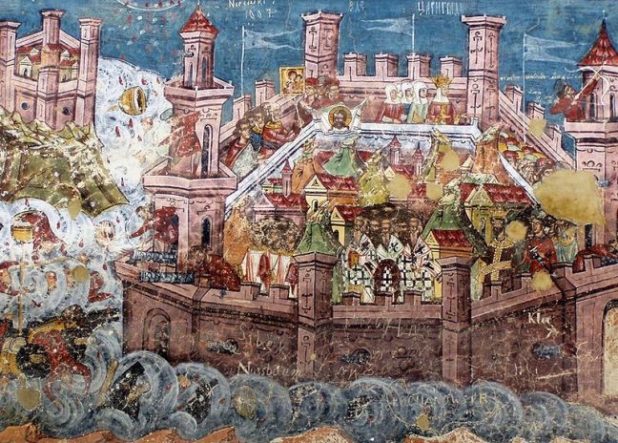Diversity Macht Frei
December 24, 2017
I’m been forcing myself to read the second volume of Simon Schama’s godawful book “The Story of the Jews: Belonging 1492-1900”. Like all of Schama’s books, it’s hard going. His pretentious prose is an ordeal and his background as an art historian leads him to linger inordinately on the undistinguished history of Jewish artistic productions. His stock-in-trade as a historian seems to be packing his books with trivial details that his researchers have dug up for him so can amaze the lowly goyim with his detailed knowledge of irrelevant factoids from the past.
I force myself to read these books because we need to stay up-to-date with the latest versions of the falsified historical narrative that the Jews are imposing upon us. Now and then, though, some interesting glimmers of truth break through; as in this passage about Jewish support for the Muslim Turks during their siege of Christian Constantinople.
Some thousands, speaking Yevanic Greek as their daily tongue, were the descendants of Jews who had lived in Byzantine Constantinople, often in those same districts. By conspicuously withholding support from the Byzantine governor during the Ottoman siege and conquest in 1453 (or at least perceived as being neutral if not pro-Turkish) they had avoided the fate of being treated as captive slaves. The most influential account of Jewish response to the fall of Constantinople was the Cretan Rabbi Elia Capsali’s history of the Ottomans, written in Candia, still a Venetian possession in 1523. Capsali is a beautiful writer but at the dawn of Jewish historiography it was natural for him to make his story a second coming of the Books of Nehemiah and Ezra. Thus Mehmed becomes a new Cyrus, who is chosen by God to be the instrument of His punishment on the brutal and oppressive Greeks. The Ottoman lord, on the other hand, ‘invites’ the Jews of conquered Byzantium – in the Balkans and islands – to come to his new capital and prosper there, ‘every man under his vine and fig tree’.Jews had no choice in the matter. Instead of a benevolent invitation they were summarily uprooted in their hundreds and thousands and forcibly resettled in Constantinople. Often they had to meet deadlines for their removal after which they could be punished by death. This surgun, as it was called, was routine practice in the Ottoman Empire and in the long run the outcome was to create a thriving, richly heterogeneous community in Constantinople. But that doesn’t mean it was not deeply unsettling if not actually traumatic at the time. Capsali writes the story as if it were the exact obverse of the Iberian expulsions, but if you were a Salonika Jew ordered to move to Rhodes after its conquest in 1523, or a Hungarian Jew in Buda in 1526 taken off as ‘useful colonists’ in Turkish boats and planted God knows where, you would have been hard put to tell the difference.
Schama, Simon. Belonging: The Story of the Jews 1492–1900
So the Jews resident in Christian Constantinople were perceived by the Muslim besiegers as being friendly; they were given favourable treatment after the conquest was complete; and the Muslim victory was recorded in Jewish historical memory as a great thing. Jewish betrayal of Christians to Muslims during sieges is a standard tactic. I’ve written about previous examples of the same thing in Caesarea, Rhodes and various cities in Spain.
Schama makes a good point that the Turks’ treatment of the Jews was not that different from the expulsions in Spain. Yet the Jews wrote it up and remembered it differently. Here we see the dawn of the Islamophilic/Christian-bashing discourse that has gone mainstream in recent times. Contrasting the “tolerant Muslims” with “intolerant Christians” is one of the staples of multicult propaganda. The Jews invented this meme and have pushed it through the centuries, disregarding its lack of correspondence with historical fact. I’ve written before about how Disraeli and Geiger promoted these ideas in the 19th century, but now we see that Jews were doing it as early as the 16th century.
Anti-Islam activists like Douglas Murray, Robert Spencer or Tommy Robinson bemoan the irrational Islamophilia that dominates so much of our public discourse, but they are unwilling to trace it to its historical roots, because doing so would lead back to their paymasters, the Jews.
 Daily Stormer The Most Censored Publication in History
Daily Stormer The Most Censored Publication in History



